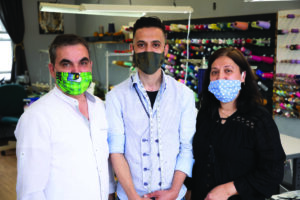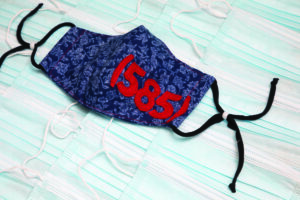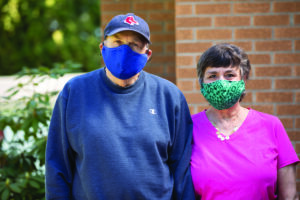Masks—they’re the talk of the town. Love them or hate them, most people have to have them. Here we shine a light on the people making them locally, for reasons of altruism, profit, or—most commonly—some of both.
Rochester native and mother Gretchen Ippolito’s motivation to make masks started with her family. She has a daughter who serves in the military, and her father is at high risk in a retirement home. Ippolito says that, in the beginning, people would jeer at her, questioning whether or not her masks would even work. Though they’re not CDC compliant, Ippolito stresses that “even if it just makes that one person feel safe, the mental health of that alone is worth my time.” She has made many mask donations the past few months, most notably to the Air Force. As of the time of this interview, she had donated more than 400 masks. Needing money to replenish her materials, Ippolito started selling her masks for five dollars each, eventually opening an Etsy store. She makes them in a wide range of materials, from cotton to silk to flannel, even going as far as disassembling furnace filters for the HEPA filter inside.
Jina Park is another Rochesterian who started out making masks for friends, neighbors, and the local mailman. “First I started giving them out to my friends and the post office; then, when I started posting my masks on Instagram, that’s when people started asking me to make them,” she says. Park has been crafting for many years. “I’m a fabric artist,” she says. “I create sculptures, figurines, and cloth dolls.” Though Park had some materials on hand, she has found it difficult to find specific kinds of fabrics. “I’ve tried Jo-Ann’s curbside pickups,” she says. “With the app, it’s not easy to find what kind of fabrics are available. Also, the variety is very narrow. You’ll go to a few stores looking for the right fabric.” She prefers to get her fabrics in person. “You have to feel the texture and see for yourself what you are getting.” Park’s preferred style, which she finds easier to get off and on, has the ear loops on each side.
Margaret Spevak is a veteran quilter who has been sewing since her junior year of high school. She went to school for home economics and later became an educator, teaching high schoolers how to sew. “I’ve been teaching in the greater Rochester area for thirty years now,” she says. If not for COVID-19, Spevak would have been at a quilting retreat this spring. She instead found creative ways to continue her passion for teaching through Zoom. “I would send [the students] the material and the pattern, and we would do a Zoom session where we would make them together. Everybody had so much fun,” says Spevak. As far as selling the masks goes, she says, “I’m in the process of changing my website and putting in a sales component because I think this is going to go on for a bit.”
A local disk jockey and father of four with one on the way, Chris Sweet is looking at this situation long-term as well. “I started making the masks in the beginning of April when I got laid off from my job,” says Sweet. He was inspired by seeing a friend making masks and selling them online. With no history of or background in sewing, Sweet borrowed his mother’s sewing machine and quickly taught himself. He says, “I’ve almost been doing it full time between donations and selling masks.” Sweet has been experimenting with many different types of materials for his masks, saying, “I’ve made ones with pleats, with filter pockets, with nose bridge wires, all of that good stuff.” Unlike Park, Sweet has found much success with Jo-Ann’s curbside pickup. Sweet sells most of his masks online through Etsy or social media. His most requested masks are made with fabric in tropical patterns. “I think people are thinking about vacation,” he says.
Twenty-eight-year-old Myia Eton of Rochester took up sewing as a fun hobby while she was growing up. She learned the skill from her mother. “I started sewing mainly for myself,” Eton says. “I would be doing some type of art project or making curtains for the house or making an outfit for an event.” Eton is accustomed to making alterations for other people but has always done her work for free. She says “I never really liked the idea of taking money when it was something fun for me. [For] the mask, I had to take a different approach.” Originally Eton made a few masks for her family, but then her uncle, who is a greeter at Wal Mart, asked for a few masks for work. “Tons of people see him, and he’s like that, you know, showing off … and dresses according to whatever mask he’s wearing.”
When Eton started, she was giving her masks away for free but found herself in need of money in order to purchase more materials for the masks and cover shipping costs. She likes collecting fabrics with her mother but has also found good materials locally and online. One of her challenges is creating masks that fit many face shapes and sizes. “I started off using the ribbon ties, but those masks were too big for children, so I had to work around that.” She prefers using elastic, but that has been very difficult for most mask makers to find.
For some mask makers, sewing has become an integral part of their way of life. EmmaLee Wolf, a bartender for more than eleven years, has been out of a job since March 14. “I’ve been sewing since I can remember,” she says, and credits her uncle for getting her interested in exploring her creativity with the fabrics they collected together. “I’ve been sewing costumes on and off for GEVA Theatre for three years,” she says. For Wolf, sewing is about self-expression and one’s own artistic style. She says that the regulars from her former bartending job have been some of her most loving and supportive customers. “I was out of a job, and unemployment hadn’t kicked in yet, so what else was I to do?” says Wolf, “but I’ve been very overwhelmed and honored by the love and support from my community.” She enjoys it when people give her the freedom to mix and match the patterns.
The Victor Tailor, a family-owned shop in the village of Victor, has CDC-compliant masks that are custom-tailored—customers go in for a mask fitting. Mert Ozturk, family member and employee, says that the goal during this time is to make masks at an affordable price that allow people to express their personal style. “When shops and everything open back up, people are still going to need protective gear for quite some time,” says Ozturk. “We love our customers and want to make sure they look and feel their best when they are out, so the shop is already preparing to make masks that can match blazers, suits, and other formal attire.
Lucky Nahum is another designer taking advantage of this unexpected opportunity. Nahum creates high-end fabrics and shirts—he is known for his double-button designs. “A long time ago I decided I didn’t want to sew,” he says. Knowing that his strengths were in design, Nahum has been working with a colleague of his wife to put the fabric to good use making masks. “I saw a report on TV that said, don’t go giving the masks to the hospitals because they need the N95s, so give them to your friends; give them to your neighbors.”
Sue Williams has been sewing for as long as she can remember. “When I first started making them, they were for family and friends and I was using my fabric stash, so you got whatever I had,” she says. Williams also says that since her supply ran out, it’s been difficult to find fabrics but that “if you look hard enough, they are there.” She uses groups on Facebook and elsewhere online to reach out for materials. In the beginning, Williams made her masks one at a time but soon started a production line.
“What you don’t know is that she’s huge into arts and crafts,” her husband pipes up.
Williams continues, “The basement is laid out with arts and crafts, sewing machines, serger machines, and oh boy, everything else!” And that when she gets started crafting, that is when she gets into her zone.
Emily Beagles is a Rochester Institute of Technology graduate from Virginia who loves science and photography.
Views: 4







